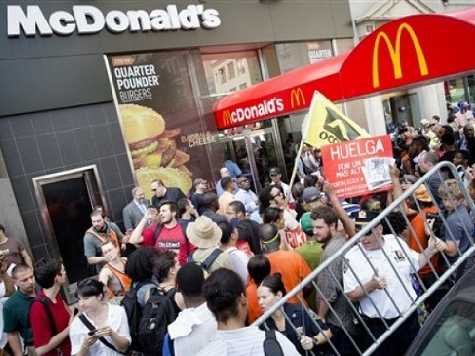Fast-food workers, who do not see their jobs as entry-level jobs but instead believe that the jobs are worthy of higher pay, carried out a huge strike on Thursday across the nation.
McDonald’s Corp., Wendy’s Restaurants LLC, Burger King Worldwide Inc., and other fast food companies were hit by workers in 50 cities; their compatriots at Macy’s Inc., Sears Holdings Corp., and Dollar Tree Inc. followed suit in some of the cities. Last November, roughly 200 fast-food workers struck in New York City. Chicago, Detroit, and Kansas City were among other cities which had strikes in April and July.
The workers want to form unions and are demanding more than double the current federal minimum wage, an increase from $7.25 an hour to $15 an hour. The National Employment Law Project states that the median wage for front-line fast-food workers is $8.94 per hour. Most private-sector fast-food jobs are non-union.
Martin Rafanan, a community organizer in St. Louis, Missouri, ignoring the fact that the jobs being discussed generally used to be for teenagers who were planning to move on to better-paying jobs, said:
If you’re paying $7.35 an hour and employing someone for 20, 25 hours a week, which is the average here, they’re bringing home about $10,000 a year. You can’t survive on that. Unless we can figure out how to make highly profitable companies pay a fair wage to their workers, we’re just going to watch them pull all the blood, sweat, tears and money out of our communities.
The National Restaurant Association, the trade group for U.S. restaurants and fast-food chains, said the arguments over pay “should be based on facts.” Scott DeFife, the organization’s executive vice president of policy and government affairs, argued, “Only five percent of restaurant employees earn the minimum wage and those that do are predominantly working part-time and half are teenagers.”
Fast-food companies agreed. McDonald’s issued a statement saying, “McDonald’s aims to offer competitive pay and benefits to our employees. Our history is full of examples of individuals who worked their first job with McDonald’s and went on to successful careers both within and outside of McDonald’s.”
Predictably, the Service Workers International Union is backing the strike with financial and technical support. Tsedeye Gebreselassie, an attorney at the National Employment Law Project, said, “The workers are responding to total failure on behalf of the federal government to raise the minimum wage to keep up with inflation and the cost of living.” With the economy tottering, part-time service work and low-paying jobs have been the primary refuge for job-seekers.
Dorian Warren, an assistant professor of political science at Columbia University, noted the presence of the strike in several Southern states and claimed, “The South has always been the model for low wage employment, from slavery to the Jim Crow laws, to the present. It’s also the most anti-union part of the country, so the fact that workers feel empowered enough to take collective action is enormous.”

COMMENTS
Please let us know if you're having issues with commenting.